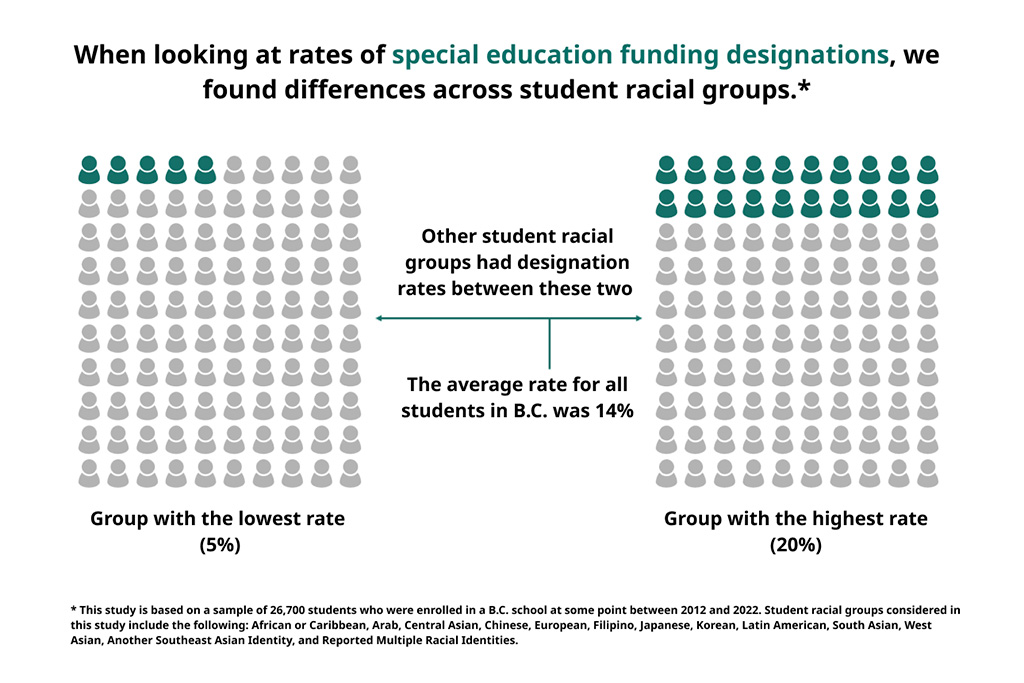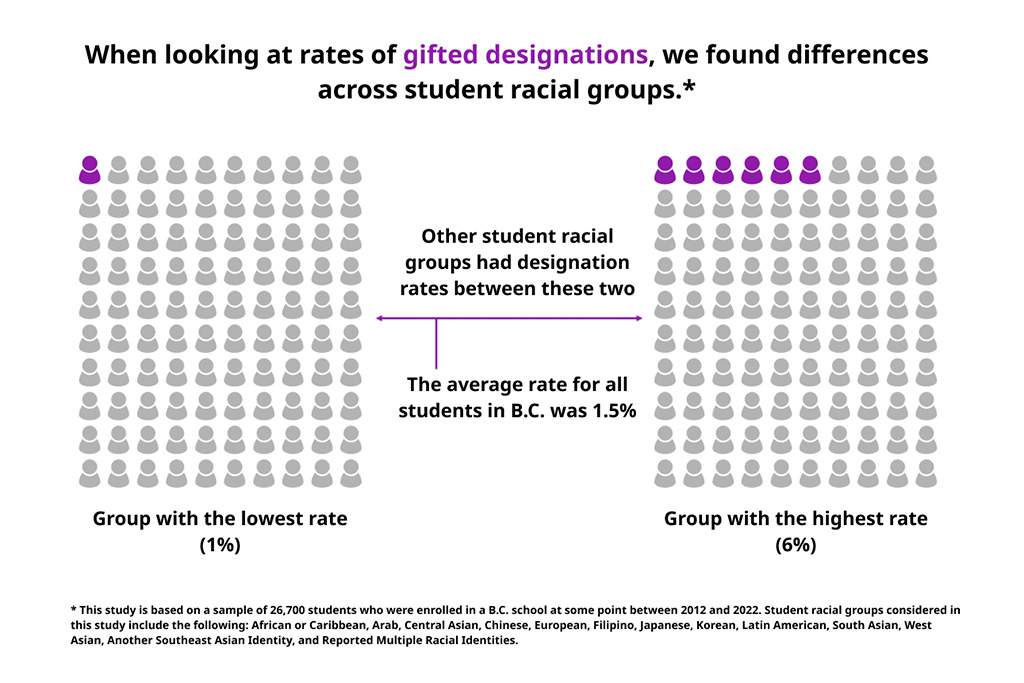Accessing learning supports in B.C.’s K-12 system
Research update May 30, 2024

Our schools should be safe and welcoming places for students.
Yet we know that many Indigenous and racialized students face barriers due to systemic racism in the K-12 system.
This impacts their well-being and their ability to succeed.
To fix this, we need to understand more about students’ experiences and where they need learning supports.
With this information, we can identify gaps in our education system. This will help us give every student what they need to thrive.

What did we learn and what are the next steps?
To fix systemic racism in education, we need to understand the experiences of students in the K-12 system.
We’re doing this research in phases to understand where there are gaps in support.
In the first phase, we explored how students across racial groups have their diverse needs recognized by schools. We did that by looking at rates of special education funding designations for each racial group.
Gifted designations help students who show exceptional skill in specific subjects. There are many reasons a student may receive another special education designation, including:
- Physical disabilities
- Visual impairment
- Deaf or hard of hearing
- Learning disabilities
- Neurodiversity
- Autism Spectrum Disorder
Designations are used to provide funding to school districts to cover the additional costs of programs and services for students with disabilities and diverse abilities. Students’ learning outcomes may be impacted if they don’t receive the supports they need to access their education. This makes designations an important first step of research on student experiences and learning outcomes.
Decisions about the designation of students are made by school districts and school-based teams. Designations don’t show the full range of abilities or skills of students and they are not required to access services or supports.
We focused on 26,700 students for this research
These students were in school at some point between 2012 and 2022 and whose racial information was available from the BC Demographic Survey
We found that in the past 10 years the rate of designations varied among racial groups.

There are many reasons rates may differ, including:
- Barriers in accessing specialists
- Living in an area where there are more specialists
- School district policies, programs and resources
- Families’ access to resources and information
We’re already working with partners to understand what may be driving differences in these designations. We will use this information and the K-12 Anti-Racism Action Plan (PDF) to identify what actions are needed.
In future phases of research, we’ll also look at:
- Exploring other areas of student experiences and educational outcomes
- How student experiences and outcomes differ depending on gender and family income
- Partnering with Indigenous Peoples to understand how they would like to be involved in future research
Future research will support our commitment to reconciliation, outlined in the Declaration Act Action Plan

What is this research about?
This research is about understanding the experiences and outcomes of K-12 students in B.C.
To start, we’re looking at whether students are designated in special education funding categories.

Why is this important?
Students need different conditions to thrive at school.
It’s essential that our education system supports students with diverse needs so that everyone can feel and do their best.

What data did we use?
- BC Demographic Survey
- Student records collected by the Ministry of Education and Child Care
- Socio-economic index developed for K-12 students in B.C.
This research is done through B.C.’s Data Innovation Program.
Explore the results
These findings show information only for individuals who completed the BC Demographic Survey and who were in school sometime from 2012 to 2022.
They may differ from other reports that use information for the entire population of B.C.


Gifted designations help students who show exceptional skill in specific subjects. There are many reasons a student may receive another special education designation, including:
- Physical disabilities
- Visual impairment
- Deaf or hard of hearing
- Learning disabilities
- Neurodiversity
- Autism Spectrum Disorder
Learn more about the datasets used for this project at the BC Data Catalogue.
These findings are based on the views and conclusions of the researchers. They don’t reflect the opinions or policies of the organizations who provided the data for this research.

What data did we use?
This study is based on a sample of 26,700 students who were enrolled in a B.C. school between 2012 and 2022. This is only 2% of all students who were in school at that time.
To understand their experiences, we used the following datasets:
- BC Demographic Survey
- Student records collected by the Ministry of Education and Child Care
- Socio-economic index developed for K-12 students in B.C.
This research is done through B.C.’s Data Innovation Program. This program allows researchers to safely work with sensitive data.
To learn more about the experience of Indigenous students in the education system, read the 2023 How Are We Doing? report.
Who’s working on this project?
The Ministry of Education and Child Care and BC Stats are working together on the first phase of research.
As a next step, we’ll collaborate with Indigenous Governing Entities and the First Nations Education Steering Committee.

Looking to learn more?
On May 30, 2024, we released a technical report about this research project. Explore this report to learn more about our approach and processes for this project.
